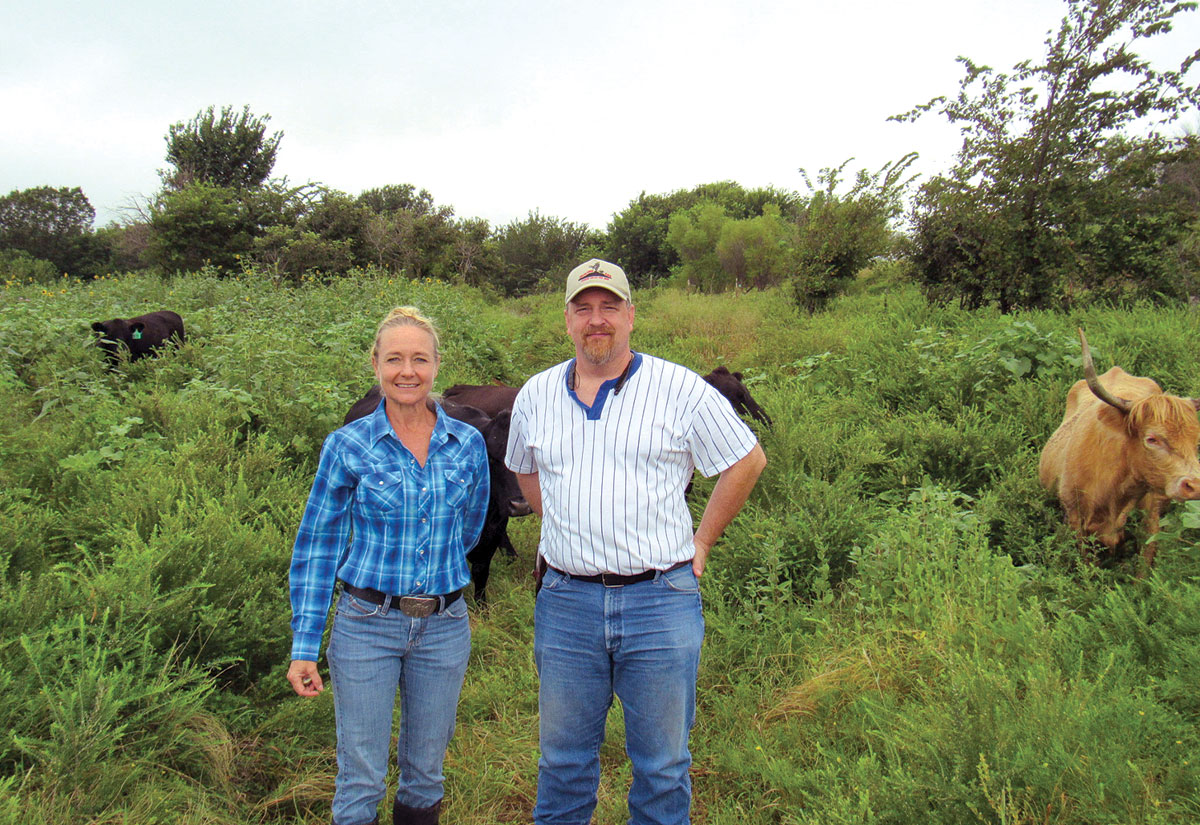
Siblings find their niche market with Lowline Angus cattle
The purity of the Angus cattle is vital to Alanna Frank, manager of Twister Ridge Ranch, and her brother Travis Pitts.
Located outside of Vinita, Okla., Twister Ridge produces Lowline Angus as naturally as possible, with no hormones, supplements or grains. Vaccinations are administered, and antibiotics when needed. Otherwise, this herd is kept as naturally as possible.
“Whooo!” Travis called into the wind towards the herd across the large pasture.
In seconds, the herd came trotting to the gate. First to make it is the stout Scottish Highlander Isabella, a marvel to look at with her orange hair and large horns. Soon more follow, all black, Lowline Angus. Their compact, shorter frame and low-stress environment is said to make for better tasting and easier to prepare cuts of beef .
“The breed is awesome,” Travis said of the Lowline Angus. He notes they’ve had no birthing problems and the cattle are rather calm under limited stress environments.
The ranch was started by Travis and Alanna’s grandfather as a traditional cow/calf operation with a herd of Hereford cattle. Once the ranch was inherited by their father, Duane Pitts, Alanna and Travis pondered ways they could have an operation that better fit their vision with the help of their spouses and parents.
“How is that sustainable?” Travis asked of the more traditional and commercial style of cattle management, in which cattle are pastured for a short time, and sent to a feed lot before being sent to processing.
“I just didn’t see all that diesel, all that expense and moving them – the stress on them. Every time you stress them they lose weight,” he added.
“How can we not do that and still raise cattle?” Alanna said.
Thus, the current Twister Ridge Ranch was born in 2010, becoming a producer in what Alanna calls custom beef.
On approximately 780 acres, a herd of 75 to 80 head rotate pastures, keeping their food source ample, well-producing and not overgrazed. With such a focus on purity and remaining as natural as possible, their pasture management is one of the most important parts of the job.
At Twister Ridge, they do not fertilize or otherwise spray fields. The only pasture management they employ is the classic cut and hay method, all while rotating the herd. Due to health concerns in the family, Alanna and Travis were inspired to find ways to limit chemicals on their pasture and in their cattle for a healthier alternative.
“The chemicals, I just don’t trust it.” Alanna said of commercial fertilizers with the shake of her head. “We are looking into eventually doing year-round grazing.”
From the pastures, the cattle are then finished with alfalfa cubes and beet pulps before being sent directly to the processor, and later straight to the customer. Although Alanna said she is looking to transition away from beet pulps due to concerns of it being truly 100 percent organic.
With all this work, the primary focus at Twister Ridge is keeping the cows as comfortable as possible. For them this means no hotshots or herding with motor vehicles.
“Low stress is better for everyone.” Alanna says with a smile.
Alanna and Travis note that their market is relatively unknown, a natural or more organic alternative to traditional commercial cattle care.
“We market, maybe 10 to 15 a year right now,” Alanna said “But we’re growing.”
Still, they say more people are beginning to call and ask about their process.
“They’re asking how it’s done,” Alanna said happily, “I think people are becoming more aware. It’s not the same as the generation before.”
Twister Ridge is also home to 40 miles of horse trails, where Alanna and her husband host endurance riding. This year, Alanna is proud to host the distance national championship.
For this ranch operation, family is everything, and everyone pitches in a helping hand.






